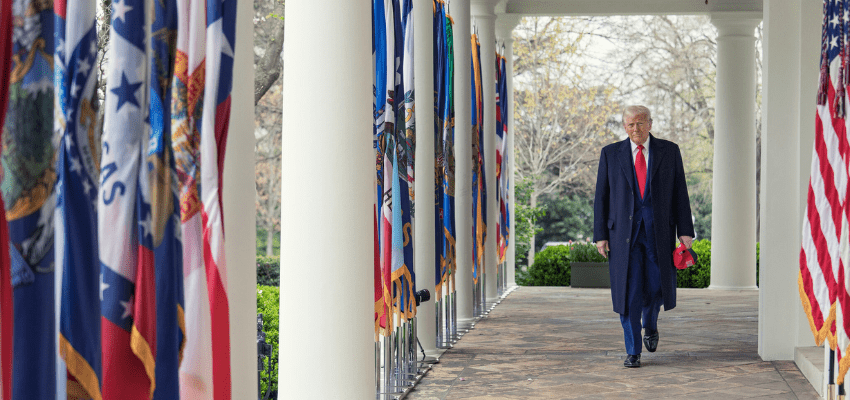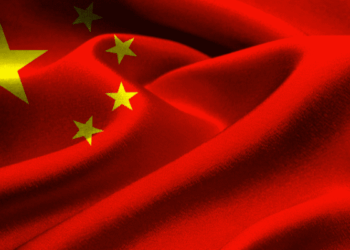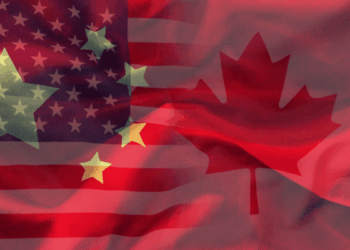This article originally appeared in Real Clear World.
By Jamie Tronnes & Christopher Coates, April 7, 2025
The Canada-U.S. relationship has never been so strained: American tariffs and Canada’s willingness to retaliate have sparked significant anger and hardship on both sides of the border, and it’s putting continental security at stake.
Already, these tariffs are negatively impacting the Canadian economy, as the uncertainty they bring further alienates investment in Canada, as well as in the U.S.
That’s not just an economic problem, it’s a security risk. An impoverished Canada creates precarity that will endanger the United States. Instead of having a stable G7 economy on its border, steep tariffs will drive America’s northern neighbor into a deep recession. Many analysts are watching the Canadian dollar with concern.
An economically weakened Canada cannot fund the very measures that U. S. President Donald Trump’s administration is asking it to support. Items like beefed up border security, increased defense spending, fentanyl crackdowns, and mining infrastructure are not affordable with a declining Canadian tax base. As our colleague Balkan Devlin has argued, an impoverished Canada won’t have the cash for continued upgrades on NORAD’s early warning system, a crucial American demand in protecting the continent.
The recently announced Iron Dome for America—in whatever form it eventually takes—will provide the U.S. with critical defenseand deterrence against 21st Century threats. The United States will also need to ensure that its Northern Flank is secure by air, land and sea. Canada can provide assurance of this region’s security, and potentially contribute to the development and implementation of the Iron Dome for North America. America’s Northern Flank will need to be defended, and Canada can better play its role if an economic partnership is supporting the defenserelationship.
It’s been widely commented that Canada is not contributing enough financially and materially to continental defence or its NATO commitments. Canada has now had at least a wake-up call that the alliances it has taken for grantedcannot be neglected any longer. Maintaining these relationships—which secure the continent—will take work on both sides.
Trust and intelligence sharing between Canada and the United States form the bedrock for joint operations and addressing continental threats. The U.S. may have the ears but Canada has the eyes, particularly in the North. It can play a crucial on-the-ground role monitoring what activities are being carried out in the Arctic by this continent’s adversaries. The intelligence sharing partnership between Canada and the U.S. for NORAD defense purposes is even more important and must be maintained for the good of the continent.
Trump’s trade advisor, Peter Navarro, rationalized steel and aluminum tariffs on Canada on the grounds that it’s important for America to have a strong defense industrial base. But this is a high-risk low-reward action: it will take years—if not decades—for America to develop a steel and aluminum industry with the capacity to replace external suppliers. Meanwhile, the tariffs will not work slowly., Instead, they are already disrupting Canadian steel and aluminum manufacturing that the U.S. defense industrial base depends upon. Indeed, the American Aluminum Association—which represents a large segment of aluminum manufacturers—has asked the Trump administration to drop aluminum tariffs to ensure supply for domestic smelters.
An economic downturn in Canada may also affect the Trump administration’s border security goals. Rising unemployment in Canada will lead to a flood of temporary foreign workers seeing their work permit renewals denied. At the end of 2024, Canada had 3 million non-permanent residents. Even with increased patrols, America may need to brace for additional numbers flowing southward to the U.S. in search of jobs, compounding America’s migration crisis.
Canadians are also worried about why tariffs are coming into effect. Trump has said previously that Canada should consider becoming the 51st state, which would make tariffs a moot point. While serious people do notview this as a plausible scenario, caught in a hot-mic moment, then-Canadian prime minister Justin Trudeau claimed that Trump wanted to annex Canada in order to access its critical minerals.
Thirty-four critical minerals exist in Canada, as well as rare earth minerals, metals, and even gases like helium which is used to make semiconductors. The quality of the Canadian deposits is quite high. The province of Saskatchewan, for example, boasts the world’s largest deposits of high-grade uranium, while the Yukon territory has the globe’s biggest high-grade tungsten deposit—an opportunity in which the U.S. Department of Defense has invested.
China dominates the global market on many of these minerals and metals needed for building components, particularly in the defense sector. Indeed, F-35 fighter jet deliveries were halted in 2022 when it was discovered that an alloy sourced from China was used to make magnets in the engine’s turbomachine pumps. Investing in Canadian mining can provide the United States defense industrial base with near-shored options from an ally, rather than an overseas supply from a hostile power. The result would be a stronger continent using its vast resources to support a robust and integrated defense industry.
The president is correct that securing Greenland within the American geopolitical sphere of influence is in America’s best interest for national security. But alienating its people is not. Trump has doubled down on talk of annexing Greenland for “national security” reasons, leading to a pro-sovereignty but anti-American party winning Greenland’s most recent election. Likewise, ensuring Canada remains a staunch American ally and lives up to its NORAD and NATO commitments is crucial to securing the continent. Unfortunately, the administration’s threatening rhetoric has resulted in 27 percent of Canadians now seeing the United States as an enemy. This own-goal scoring needs to stop.
The costs of tariffing allies is too high. Trading national security for the impoverishment of Canada risks too much. The United States can either have a strong and stable North America or it can have tariffs on its closest ally. It cannot have both.
Jamie Tronnes is the executive director of the Center for North American Prosperity and Security, a project of the Macdonald-Laurier Institute. She is based in Washington, D.C.
LGen (Ret’d) Christopher Coates is the director of national defense and foreign policy at the Macdonald-Laurier Institute. He is based in Ottawa








